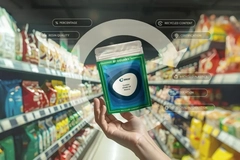FINAT urges European Commission to exclude “negative list” from packaging waste directive revision
The label industry association argues the reported plans would curtail recycling investment

31 Oct 2022 --- FINAT has released a statement expressing concern over the European Commission’s reported plans to revise its Packaging and Packaging Waste Directive with a “negative list” of packaging characteristics, suggesting that to do so would impede the progress of recycling technologies.
Reportedly, the list intends to alert manufacturers to properties and materials that are not considered recyclable and ensure that packaging is designed for a circular waste stream at the outset.
Alternatively, FINAT proposes to emphasize the definition of criteria for Design for Recycling in a technology-agnostic manner, and involve a multi-stakeholder Expert Group in the development of Design for Recycling guidelines for the specific packaging materials.

“We consider that the definition of recyclability of packaging, as well as the process to assess the recyclability of packaging, must be technology and material agnostic. Therefore, we strongly oppose the inclusion of a ‘negative list of packaging characteristics’ in the text of the new legislation,” says Pablo Englebienne, regulatory affairs and sustainability manager at FINAT.
Generic list issues
Englebienne continues by explaining that a generic list of this sort cannot be considered comprehensive, science-based and future-proof.
“It assumes that anecdotal evidence fully describes state-of-the-art recycling processes, ignoring recent and ongoing developments and innovations in manufacturing and recycling of packaging. In fact, packaging with several of the suggested ‘characteristics’ is recyclable and is currently recycled in practice,” he explains.
FINAT suggests that Design for Recycling criteria should be defined with the support of multi-stakeholder expert groups. FINAT represents over 600 member companies covering the complete value chain of the self-adhesive label industry. The label printing industry directly employs over 100,000 people in the EU, with a yearly revenue of over €14 billion (US$13.9 billion). FINAT says it is committed to increasing the environmental sustainability of the value chain and applying circular economy principles in packaging.
A generic “negative list” conflicts with the establishment of Design for Recycling criteria that account for the compatibility of packaging materials and components in material- and format-specific recycling processes in an effective and non-discriminatory manner, asserts the company.
Calling for science-based approaches
Earlier this year, RecyClass published the RecyClass Design Book, a practical guide clarifying the concepts of recyclability and design for recycling based on a science-driven approach. The document is intended for all plastic industry members working on designing recyclable plastic packaging.
FINAT believes that such cross-sector projects, not only RecyClass for plastic packaging but also 4evergreen for fiber-based packaging and CEFLEX for flexible packaging, are already addressing recycling challenges.
“In our opinion, the definition of performance classes within each of the packaging categories would result in the same effect that is intended by a ‘negative list,’ but with a more certain and science-based approach,” says Englebienne.
A premature decision?
FINAT reiterates that any definition of a “negative list” prior to the establishment of comprehensive Design for Recycling criteria would be premature and fail to provide regulatory certainty for business, severely discouraging ongoing investments in developing materials, components and recycling for current and future packaging solutions, therefore derailing the development of a circular economy for packaging.
“We, therefore, encourage the European Commission to emphasize the development of parameters to ensure comprehensive Design for Recycling criteria and refrain from including a ‘negative list’ in the upcoming Packaging and Packaging Waste Regulation,” asserts Englebienne.
“This approach will ensure that packaging placed in the EU market is compatible with the recycling streams in place, contribute to effective recycling of packaging waste at high rates, and yield high quality secondary raw materials to enable a true circular economy.”
By Natalie Schwertheim












